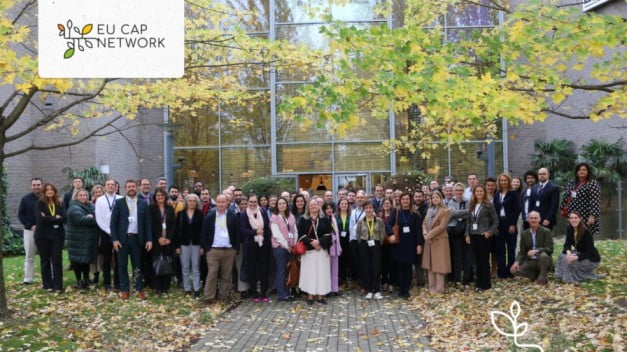The CAP Implementation Contact Point (CAPI CP) of the EU CAP Network, in partnership with the European Commission’s Directorate-General for Agriculture and Rural Development (DG AGRI), organized the 3rd edition of the ‘Forum on Best Practices in the Agri-Food Supply Chain’ on 16 November in Brussels.
The BEATLES project was represented by Serafin Pazos-Vidal, Senior Expert at AEIDL (European Association for Innovation in Local Development). This forum launched in 2021 under the Farm to Fork Strategy to enhance cooperation between primary producers, improving their position within the food supply chain and increasing market transparency.
This year’s edition focused on the cost-of-living crisis, specifically addressing present food price inflation (see agenda).
To set the scene, Pierre Bascou from DG AGRI and Professor Alan Matthews of the University of Dublin Trinity College highlighted that the recent inflationary run of food prices has been unprecedented for the last two generations. Although it has decreased in the last few months, prices are unlikely to return to pre-existing levels. Contrary to general perception, Professor Matthews argued that the start of the present inflationary crisis was not due to COVID-19 but rather a complex set of factors, including the increase in global demand and reduced output due to climate-related impacts.
Broadly three types of government response to addressing food price hikes have been carried out.
Some countries (Germany, Italy, Austria, Ireland, Czech Republic) implemented general support packages, primarily targeting energy price hikes rather tdwhan food prices per se.
Other countries launched additional packages addressing food price inflation, such as reduced VAT rates for food, food vouchers, price controls at retail, or on foodstuffs (Spain, France, Poland, Romania, Greece, Portugal, Hungary, or Bulgaria).
Some countries, like Greece and Germany, considered how targeted support measures could be, as VAT reduction was deemed insufficiently targeted, with its impact on alleviating the impact of inflation on the final consumer not being sufficiently transparent.
Various stakeholders, including representatives from competition authorities and oversight bodies from Portugal, Sweden, and France, as well as farming union representatives (COPA, CEJA), retailers, the food and drink industry, consumer representatives (BEUC), farming and academic stakeholders, participated in the roundtables and breakout workshops.
Farming representatives highlighted the significant challenge that food inflation poses to farmers, even with CAP and ad hoc inflation reduction measures. Many farmers are heavily indebted, particularly in value chains where they face significant late payments from intermediaries.
Retailers, on the other hand, assert that even with temporary measures, price rises have been so high and fast that it has cut into their margins, and in some respects, they have had to absorb losses.
The consumer response to COVID and food price inflation appears to be very sensitive, irrespective of income levels. A recent study by Grunner et al. (2023) surveying 10 European countries identifies a trend towards thriftiness but also towards mindfulness, as Professor Matthews describes. The research shows, and the retail industry echoes, that most income segments of the population have been price-sensitive. Among those surveyed, one-third are buying cheaper food, but they are also more sensitive to buying less but better food (more sustainably produced and healthier).
The Sustainable Food Price Monitor from Wageningen University & Research (a BEATLES partner) indicates that while the proportion of sustainable food in the basket has slightly decreased by one point to 18% in 2022, the share of high-quality and labeled meat (e.g., the Dutch “Beter Level” quality brand for poultry) has increased by 3 points to 47% of total purchases.
There were interesting exchanges between consumer, retail representatives, and farmers. The latter affirm that although “peak meat” has already been reached in Europe, this is not the case elsewhere, impacting food prices and the overall sustainability of the agrifood sector. Higher prices do not compensate for the fact that prices for producers have been abnormally low for decades. Many environmental costs still need to be fully internalized in the price at which the farmer sells and the final consumer pays. The price and sustainability impact of worldwide imports, margins across the value chain, and more expensive retail prices (perhaps with more quality as a trade-off) need to be considered as a whole. In this respect, big agrifood industry and retailers have a role to play in shaping consumer choices. Purchases are not only the result of individual preferences but are also supply-led.
The EU and governmental regulation play a key role, from the relatively recent EU Directive 2019/633 on unfair trading practices in the agricultural and food supply chain to targeted measures driving behaviors (e.g., sugar tax) to more targeted measures such as food vouchers to complement lower salaries (standard practice in some countries but carrying a stigma in others) and the need for targeted income support for vulnerable households.
While this problem is much wider than the scope of the BEATLES, this project will prepare a set of EU policy recommendations to make value chains, particularly at the farm level, more sustainable and adapted to climate-induced changes in food production, a key driver of food price inflation that will not go away.


